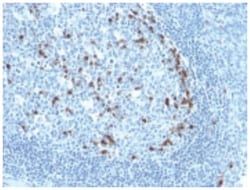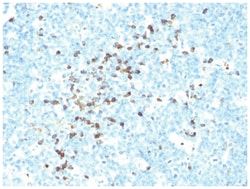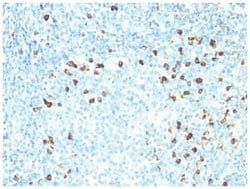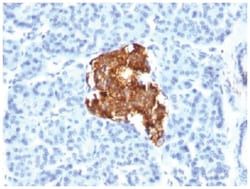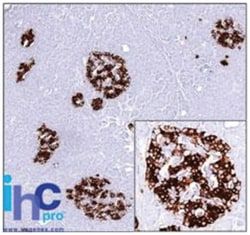Kappa Light Chain Antibody (KLC709), Novus Biologicals™
Manufacturer: Fischer Scientific
The price for this product is unavailable. Please request a quote
Antigen
Kappa Light Chain
Classification
Monoclonal
Conjugate
Unconjugated
Formulation
PBS with 0.05% BSA. with 0.05% Sodium Azide
Gene Alias
HCAK1, IGKCD, immunoglobulin kappa constant, Km, MGC111575, MGC62011, MGC72072, MGC88770, MGC88771, MGC88809
Host Species
Mouse
Molecular Weight of Antigen
22.5 kDa
Quantity
0.2 mg
Research Discipline
Adaptive Immunity, Immunology
Gene ID (Entrez)
3514
Target Species
Human
Form
Purified
Applications
Western Blot, Flow Cytometry, Immunohistochemistry (Paraffin), Immunohistochemistry (Frozen)
Clone
KLC709
Dilution
Simple Western 10 ug/ml, Flow Cytometry 0.5-1ug/million cells, Immunohistochemistry-Paraffin 1:10-1:500, Immunohistochemistry-Frozen 0.5-1ug/ml
Gene Accession No.
P01601
Gene Symbols
IGKC
Immunogen
Recombinant human Ig kappa chain
Purification Method
Protein A purified
Regulatory Status
RUO
Primary or Secondary
Primary
Test Specificity
This MAb is specific to kappa light chain of immunoglobulin and shows no cross-reaction with lambda light chain or any of the five heavy chains. It recognizes human Ig kappa light chains of both secreted and cell surface immunoglobulin. It detects also free kappa light chains. In mammals, the two light chains in an antibody are always identical, with only one type of light chain, kappa or lambda. The ratio of Kappa to Lambda is 70:30. However, with the occurrence of multiple myeloma or other B-cell malignancies this ratio is disturbed. Antibody to the kappa light chain is reportedly useful in the identification of leukemias, plasmacytomas, and certain non-Hodgkin's lymphomas. Demonstration of clonality in lymphoid infiltrates indicates that the infiltrate is malignant.
Content And Storage
Store at 4C.
Isotype
IgG1 κ
Description
- Description Kappa Light Chain Monoclonal specifically detects Kappa Light Chain in Human samples
- It is validated for Simple Western, Immunohistochemistry, Immunohistochemistry-Paraffin, Protein Array.
